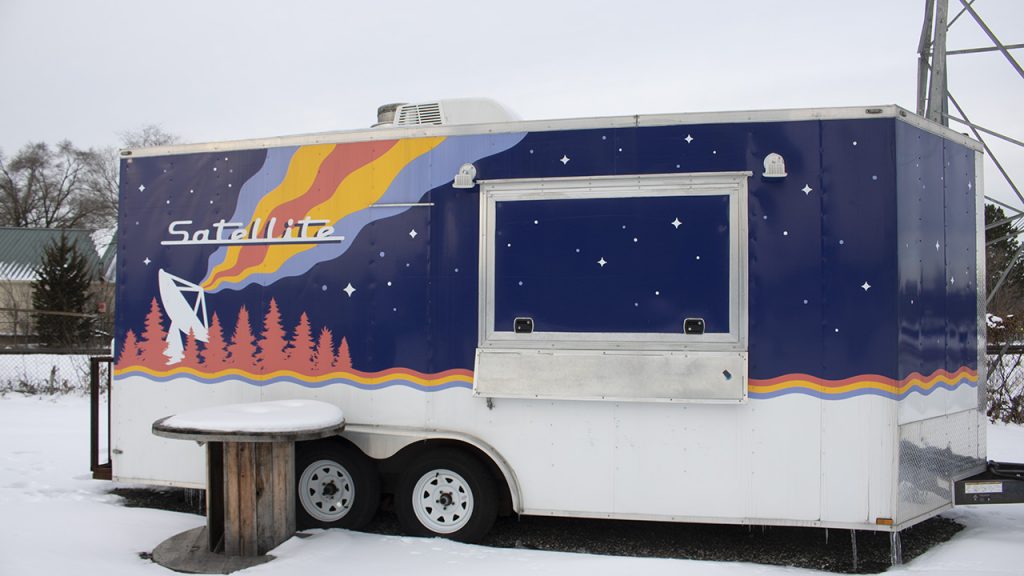Essential Cooking: Satellite owner Brennan Calnin on the benefits of owning a food truck
Brennan Calnin of Satellite Food Truck talks about supply chain headaches, the rising popularity of vegan food, and the pros and cons of owning a food truck.

Subscribe where ever you listen to podcasts:
Apple Podcast — Spotify — Google Play — Stitcher — TuneIn — NPR
Food trucks have grown in number and popularity in recent years, but what is it like owning and operating one? Chef Brennan Calnin of Satellite Food Truck joined Ann Delisi and Chef James Rigato on the Essential Cooking podcast to talk about his food truck and why food supply chain issues could benefit local food producers.
Before starting Satellite, Chef Brennan Calnin worked on the brick and mortar side of Detroit’s food scene as head chef at Ferndale mainstays Imperial and Public House, and opened Town House downtown.
“If you want to, you can chase money in a food truck. You can do all the festivals. You can work as hard as you want.” —Brennan Calnin, Satellite Food Truck
Calnin eventually left Town House and started Satellite Food Truck.
Calnin is in a unique position to weigh in on the pros and cons of owning a restaurant on wheels.
The biggest benefit, Calnin says, is the flexibility to take your food to the people.
“If you want to, you can chase money in a food truck. You can do all the festivals. You can work as hard as you want.”
That flexibility comes with a trade-off, though. Having a mobile restaurant means that equipment like generators, fryers and refrigerators need to be functioning perfectly, or the entire operation can screech to a halt.
During Satellite’s first event, the generators and fryers had issues. But it was all part of the learning curve.
“Once you figure out your equipment and get over the hump, the ability to just pivot your business has been so fun for us.”
One of the fun things for Calnin is the challenge of offering a stellar menu, without inflating food costs.
“When you margins are tight, you have to be creative with your food costs.”
That challenge has laid the foundation for Satellite favorites like a Piri Piri Chicken Sandwich and Vegan Bánh Mì.
Another challenge for food trucks is to know how much food to have on hand for a given day.
Calnin says his strategy is pretty simple: Max out and prepare to sell out every day. If there’s an extra slow day, you have the benefit of opening up the food truck the next day.
Supply chain woes: The silver lining for small businesses
Right now, a major challenge for chefs are food supply chain issues that existed long before the COVID-19 pandemic, but have been exacerbated in the last two years. Calnin says that prices and availability have been unpredictable with all kinds of food from avocados to Velveeta.
The silver lining, Calnin says, might be that business for local food producers will improve.
“In a state like Michigan, you’re going to see some of these local industries and local smaller operations start to do better, I think.”
Calnin has learned that lesson with Satellite. By embracing relationships with local food producers, he is able to avoid major blows to his food truck operation when a mainliner like Sysco runs out of something he needs.
In this episode:
- Pros and cons of starting a food truck
- Food supply chain headaches and the silver lining for local producers
- Benefits of vegan food and why it’s here to stay
Related posts:
- Essential Cooking: Online Ordering is Key Ingredient in Good Cakes and Bakes’ Resilience During Pandemic
- Essential Cooking: Starting a Successful Food Business Isn’t Easy, But Detroit Kitchen Connect Is Here To Help
- Essential Cooking: Online Grocery Store Delivers Michigan-Grown Foods
Trusted, accurate, up-to-date.
WDET strives to make our journalism accessible to everyone. As a public media institution, we maintain our journalistic integrity through independent support from readers like you. If you value WDET as your source of news, music and conversation, please make a gift today.
